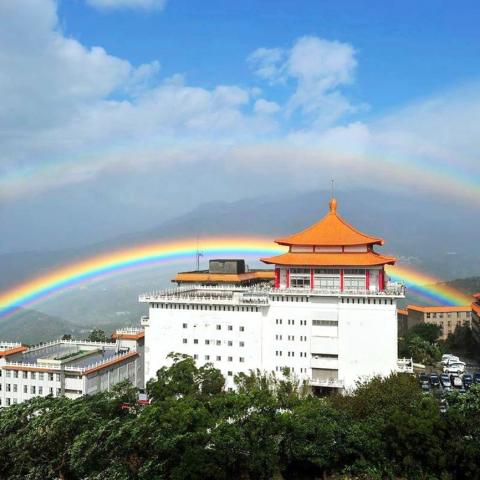Guinness World Records has officially recognized a nearly nine-hour rainbow observed from Chinese Culture University in Taipei last year as the world’s longest-lasting rainbow.
Official Guinness World Records adjudicator John Garland presented a certificate to the university yesterday for meticulously documenting the rainbow.
According to the university’s data, the rainbow, which appeared on Nov. 30, lasted from 6:57am to 3:55pm — just shy of nine hours.

Photo provided by the Chinese Culture University
It beat the 1994 record of a six-hour rainbow held by Wetherby, England, by nearly three hours.
Chou Kun-hsuan (周昆炫), a professor from the university’s Department of Atmospheric Sciences, whose team documented the event, said a total of 3,520 photographs with time codes were collected to complete a “rainbow clock,” which recorded every 9.2 seconds of the rainbow’s movements.
Rainbows last so long near the university because of moderate seasonal winds and hilly terrain, which help accumulate just the right amount of moisture near Yangmingshan (陽明山), Chou said.
Tsai Ching-yen (蔡清彥), chairman of the Meteorological Application and Development Foundation, credited faculty, staff and students with getting the rainbow recognized, saying that they took advantage of what the environment gave them and created value out of a natural phenomenon.
The rainbow now holds the title of “longest-lasting rainbow” and academics believe it will be a difficult record to beat.
Weather conditions, including everything from radiation to wind and moisture, has to be incredibly stable for a rainbow to last such a long time, and given that there is on average only 11 hours between sunrise and sunset, nine hours is probably the maximum amount of time a rainbow in Taiwan or anywhere else could last, Chou said.

Taiwanese can file complaints with the Tourism Administration to report travel agencies if their activities caused termination of a person’s citizenship, Mainland Affairs Council Minister Chiu Chui-cheng (邱垂正) said yesterday, after a podcaster highlighted a case in which a person’s citizenship was canceled for receiving a single-use Chinese passport to enter Russia. The council is aware of incidents in which people who signed up through Chinese travel agencies for tours of Russia were told they could obtain Russian visas and fast-track border clearance, Chiu told reporters on the sidelines of an event in Taipei. However, the travel agencies actually applied

New measures aimed at making Taiwan more attractive to foreign professionals came into effect this month, the National Development Council said yesterday. Among the changes, international students at Taiwanese universities would be able to work in Taiwan without a work permit in the two years after they graduate, explainer materials provided by the council said. In addition, foreign nationals who graduated from one of the world’s top 200 universities within the past five years can also apply for a two-year open work permit. Previously, those graduates would have needed to apply for a work permit using point-based criteria or have a Taiwanese company

The Shilin District Prosecutors’ Office yesterday indicted two Taiwanese and issued a wanted notice for Pete Liu (劉作虎), founder of Shenzhen-based smartphone manufacturer OnePlus Technology Co (萬普拉斯科技), for allegedly contravening the Act Governing Relations Between the People of the Taiwan Area and the Mainland Area (臺灣地區與大陸地區人民關係條例) by poaching 70 engineers in Taiwan. Liu allegedly traveled to Taiwan at the end of 2014 and met with a Taiwanese man surnamed Lin (林) to discuss establishing a mobile software research and development (R&D) team in Taiwan, prosecutors said. Without approval from the government, Lin, following Liu’s instructions, recruited more than 70 software

Chinese spouse and influencer Guan Guan’s (關關) residency permit has been revoked for repeatedly posting pro-China videos that threaten national security, the National Immigration Agency confirmed today. Guan Guan has said many controversial statements in her videos posted to Douyin (抖音), including “the red flag will soon be painted all over Taiwan” and “Taiwan is an inseparable part of China,” and expressing hope for expedited reunification. The agency last year received multiple reports alleging that Guan Guan had advocated for armed reunification. After verifying the reports, the agency last month issued a notice requiring her to appear and explain her actions. Guan